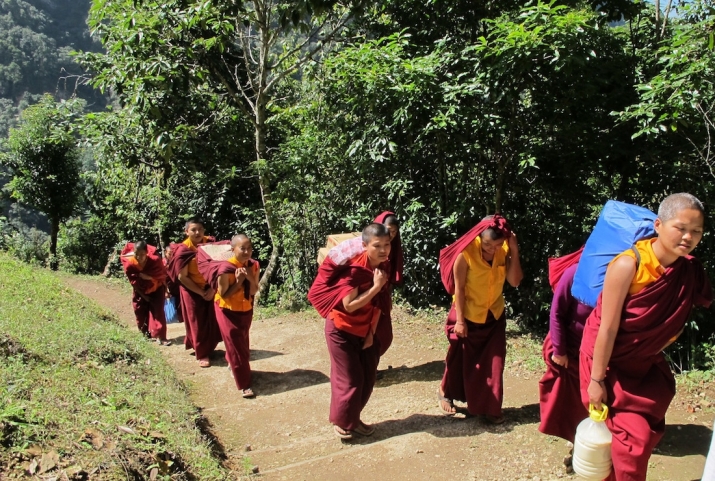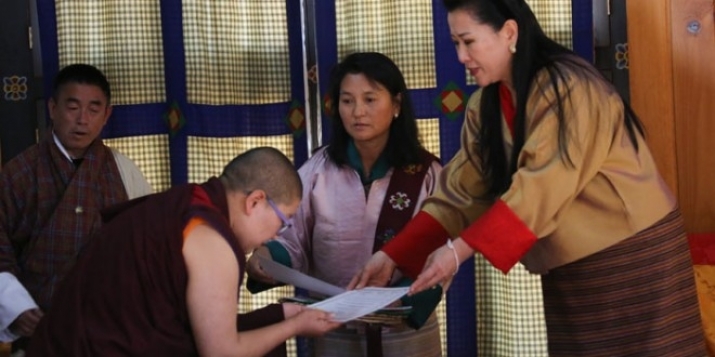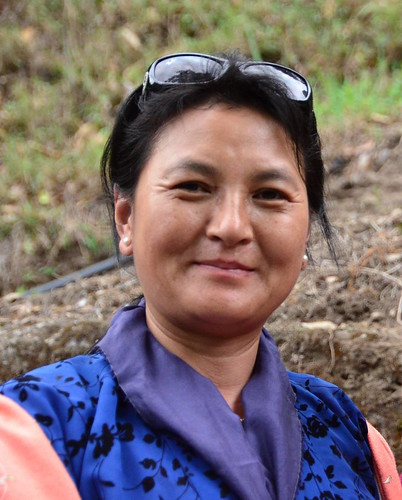By Craig Lewis
Buddhistdoor Global | 2016-08-12 |
Nestled between China and India on the eastern edges of the mighty Himalayas, the tiny Buddhist Kingdom of Bhutan is remarkable for a number of reasons. Perhaps best known for prioritizing “Gross National Happiness” over the shortsighted acquisitiveness of economic growth and for its sustainable approach to environmental stewardship, the kingdom is also unique in being the only Himalayan country in which Vajrayana Buddhism has existed as an unbroken spiritual tradition since the 8th century.
The majority of Bhutanese—about 75 per cent of the population of some 750,000 people—are Buddhists, and the monastic tradition has a long and vibrant history. Yet the idyllic image of Bhutan as a sort of spiritual haven, seemingly untouched by the ravages of unchecked capitalism, is only one aspect of a much bigger picture. While the nation’s approach to economic management has resulted in a healthy level of growth and low inflation over the last 20 years, life in Bhutan is not without very real challenges, even for those who find their calling in monasticism. Female lay practitioners in particular face major obstacles in accessing opportunities for in-depth spiritual education. Unlike monasteries for male monastics, which receive funding from the state or from private donors, nunneries in Bhutan receive very little support. Nearly all of Bhutan’s rural nunneries have poor living conditions and lack conducive learning environments.
Headquartered in the capital Thimphu, the Bhutan Nuns Foundation has been working diligently to correct this imbalance. By educating and empowering the country’s nuns, ensuring that each nunnery maintains adequate, healthy living conditions, and by providing a practical, hands-on education for the female monastic population, the foundation aims to enable female monastics to create self-sufficient monastic communities that not only provide a healthy environment for Buddhist study, but also enables them actively engage with and contribute to lay society.
While attending the recent conference “Tradition and Innovation in Vajrayana Buddhism: A Mandala of 21st Century Perspectives”* in Thimphu, I was privileged to have an opportunity to sit down with Bhutan Nun’s Foundation executive director Dr. Tashi Zangmo, who since earning a PhD in education from the University of Massachusetts, Amherst, has worked tirelessly, conducting baseline research on the living conditions of Bhutanese nun, drawing up and implementing a detailed development plan to provide a brighter, sustainable future for female monastics, and helping to spread awareness of the foundation’s mission.
Buddhistdoor Global: How did the Bhutan Nun’s Foundation (BNF) come about?
Dr. Tashi Zangmo: The BNF was founded in 2009 under the patronage of Her Majesty, the Queen Mother, Ashi Tshering Yangdoen Wangchuck. It was started simply because the lving circumstances of Bhutan’s Buddhist nuns were in dire need of attention. Personally, as a woman coming from a humble background myself, I have always aspired to work for the benefit of the women of my country, in terms of promoting education and improving the general welfare of women and young girls.
BDG: Can you describe some of the challenges you encountered during the early days of the organization?
TZ: Starting any new organization is challenging. People often do not understand why you are doing what you’re trying to do, and it takes time to communicate this with people—especially when they have different views or opinions. However, the generous support of the Queen Mother has helped to move things forward smoothly, and the small bumps we’ve encountered here and there don’t matter much to us. I often say that as long as your real intentions are clear, external challenges should not obstruct you from doing the right thing. At the foundation we view our responsibilities in reaching out to the nuns as much more than just a job.
BDG: Has the original intent of the BNF changed or evolved over the years?
TZ: Our initial objective in starting the foundation was to reach out to those who remain unreached—the Buddhist nuns throughout Bhutan—who had very few resources and often lacked many basic comforts, such as running water, a proper living situation, food with balanced nutrition, sufficient warm clothing against the harsh weather of highland areas and other necessities for those remote regions. Therefore, since its inception, the BNF has been committed to reaching out to those vulnerable nunneries that most need our support. The other intention of the foundation is to prepare the nuns to be self-sufficient and socially engaged Buddhists in this changing world. Thus we provide various training programs to empower and inspire them to broaden their horizons beyond the usual prayers and rituals.
BDG: How many nunneries and nuns are there in Bhutan, and how many does the BNF work with?
TZ: Altogether, there are 26 nunneries in the country and more than 1,050 nuns. We work with 25 of the nunneries. There is one nunnery in central eastern Bhutan, which has very few nuns and does not participate in our activities. Our support is open to any nun in the country who needs it.
BDG: Broadly speaking, how do monks and lay Buddhists in Bhutan view female monastics?
TZ: Historically, female monastics have not been very much in the picture of Buddhism in Bhutan. But now, slowly, society is beginning to recognize the value of the nuns and female lay practitioners. Bhutanese generally do not believe in gender inequality, however female monastics have traditionally always worked behind the scenes, supporting the male monastic community. In Bhutan there are many male lay practitioners with families at home who are able to go on three-year, six-year, and even nine-year retreats. They receive support from their wives to do this by looking after the children and supporting the family during their absence. In general, women have never believed in themselves in that they deserve more than what they already have. Bhutan being a Buddhist nation, humility is what we are taught from the very beginning and perhaps the women practice this more than anybody!
The Western appraoch to gender equality is quite new to Bhutanese culture. If women are able to claim their rights to property, to practice Dharma, to own businesses, they are recognized in society. In general, I believe that women in Bhutan don’t make a big deal about their status. However, Bhutan is changing too, like the rest of the world, and our younger generation will not put up with being left behind or not being given an equal share of what they deserve.
BDG: Have you experienced any opposition from male monastics?
TZ: In this samsaric world, it is natural to encounter opposition wherever we go and in whatever we do. I experience opposition in daily life. The only way we won’t meet any opposition from other people is if we go into the mountain caves to meditate in isolation! The moment you try to do something that changes society, you will always encounter opposition. If you do well, you will bump into opposition out of jealousy, and if you don’t do so well, you will find opposition in the form of condemnation. As long as we are in this samsara, opposition follows us like a shadow—but it also depends on how we deal with it; sometimes obstacles are blessings in disguise, they make us learn and make us smarter, and even more compassionate.
BDG: How has your experience running BNF changed you as an individual?
TZ: Starting the foundation under the generous auspices of the Queen Mother and being closely involved in the day-to-day running has been the most inspiring thing I have ever done in my life. Perhaps more than anything else, I’ve learned to be stubborn!

Nuns carrying daily necessities to their nunnery. Image courtesy of the Bhutan Nuns Foundation
BDG: What have been some of the most difficult challenges for the BNF?
TZ: The difficulty we constantly face in running the foundation is not being able to meet all the needs of the nuns. In the beginning, we began by providing workshops on health, sanitation, and nutrition. But we soon realized that we couldn’t talk about health and sanitation when the nunneries lacked proper toilets and running water! Thus we started raising funds to provide the basic necessary infrastructure for those nunneries that didn’t have it. We looked for sponsors to help them improve their diets and nutrition. The other challenge we constantly face is that few funding agencies or individuals are interested in supporting infrastructure improvements at the nunneries or the operational costs of the foundation.
I always say, “There’s no point in having a car if there is no driver or fuel”. In order to move the car and get to where you want to go, it’s important to have fuel and to be able to drive. These are some of the challenges that we continue to face.
BDG: What are your plans and ambitions for the future of the BNF?
TZ: We are currently constructing a training center for Bhutanese nuns and a learning space for women who are yearning to deepen their knowledge of Buddhism and spirituality. Our wish for the future with this space is to provide the nuns with a range of training programs in various life skills, such as counseling, hospice work, basic healthcare, teacher training, social work, and how to maintain an organic vegetable garden to enable self-sufficiency.
The ripple effect from all of this will be that the nuns themselves will become agents of change in society and role models for other women and young girls. Our ultimate goal is to prepare the nuns to stand on their own feet. By 2020 we aim to have enabled them to provide all of their own basic necessities and that they in turn will be in a position to train others and give back to society, rather than being passive recipients.

Nuns receive certificates of achievement from Her Majesty, the Queen Mother, Ashi Tshering Yangdoen Wangchuck after completing a training program. Image courtesy of the Bhutan Nuns Foudation
BDG: How positive are you for the future of female monasticism in Bhutan?
TZ: All things considered, I am very positive about the outlook for nuns in Bhutan. It will only get better. With the existence of the BNF and the advocacy we do for female monastics, the nuns are slowly gaining a higher profile in Bhutan and the founders of individual nunneries are becoming more and more aware of the fact that nuns are equally as intelligent, capable, and responsible as monks, if not better! Thus, within the past few years, nuns have been taking on roles of increasing responsibility and they are trusted now more than ever. So there is all the more reason to be positive about the future.
Source: Buddhistdoor.net

